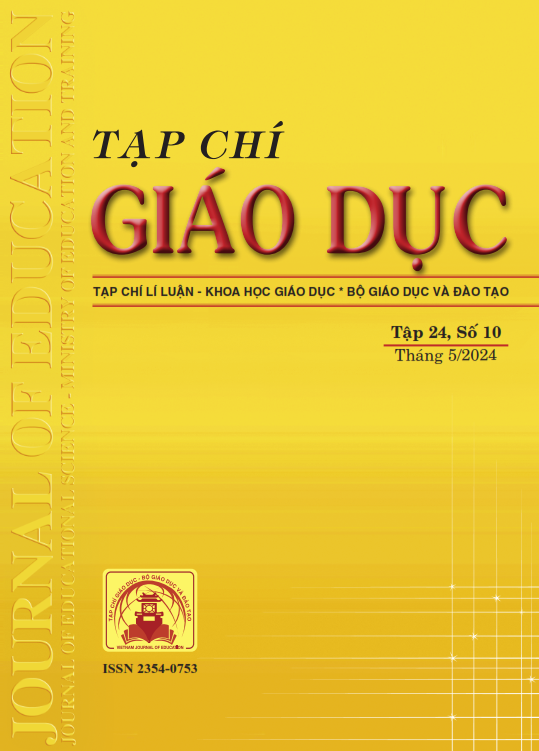Các nhân tố tác động đến “Liêm chính học thuật” của sinh viên đại học trong bối cảnh phát triển trí tuệ nhân tạo
Tóm tắt
In recent years, the proliferation of Artificial Intelligence (AI) has exerted a profound influence on the educational and academic realms. Despite serving as an auxiliary technology for learning, AI nevertheless entails various academic integrity risks. This research is directed towards analyzing the determinants of academic dishonesty among Vietnamese students, particularly assessing the impact of AI. Drawing upon data gathered from 326 responses obtained from university students within Hanoi, the authors undertook analysis utilizing the Partial Least Squares Structural Equation Modeling (PLS-SEM) framework. Hence, measuring mean differences between variables with the aid of SPSS 26.0 and SmartPLS applications. The findings reveal 9 factors influencing academic dishonesty, including Student’s intention of using AI, Opportunity, Rationalization, Pressure, The perceived awareness of academic policies, The perceived peer cheating behavior, The perceived severity of punishments, Subjective norms, and Attitude. This article presents scientific evidence concerning the influences on the integrity of university students amidst the backdrop of AI. Additionally, the authors proffer viable solutions to mitigate instances of academic integrity violations.
Tài liệu tham khảo
Ajzen, I. (1991). The theory of planned behavior. Organizational Behavior and Human Decision Processes, 50(2), 179-211. https://doi.org/10.1016/0749-5978(91)90020-t
Cressey, D. R. (1953). Other people’s Money: A study of the social psychology of embezzlement. Glencoe, IL: Free Press.
Clark, L. A., & Watson, D. (1995). Constructing validity: Basic issues in objective scale development. Psychological Assessment, 7(3), 309-319. https://doi.org/10.1037/1040-3590,7.3.309
Eccles, J. S., & Wigfield, A. (2002). Motivational beliefs, values, and goals. Annual Review of Psychology, 53(1), 109-132. https://doi.org/10.1146/annurev.psych.53.100901.135153
Fishman, T. (Ed.) (2013). The Fundamental Values of Academic Integrity (2nd ed.). Clemson University.
Hair, J. F., Anderson, R. E., Tatham, R. L., & Black, W. C. (1995). Multivariate data analysis. Englewood Cliffs, NJ: Prentice-Hall.
Hair, J. F., Hult, G. T. M., Ringle, C. M., & Sarstedt, M. (2013). A primer on partial least squares structural equation modeling (pls-Sem). Sage Publications.
Henseler, J., & Sarstedt, M. (2013). Goodness-of-fit indices for partial least squares path modeling. Computational Statistics, 28(2), 565-580. https://doi.org/10.1007/s00180-012-0317-1
Kline, R. B. (2016). Principles and practice of structural equation modeling, fourth edition (4th ed.). Guilford Publications.
McCabe, D. L., & Trevino, L. K. (1997). Individual and contextual influences on academic dishonesty: A multicampus investigation. Research in Higher Education, 38(3), 379-396. http://www.jstor.org/stable/ 40196302
McCabe, D. L., Trevino, L. K., & Butterfield, K. D. (2001). Cheating in academic institutions: A decade of research. Ethics & Behavior, 11(3), 219-232. https://doi.org/10.1207/s15327019eb1103_2
Thu Quỳnh (2019). Đạo đức học thuật trong khoa học xã hội và nhân văn và những khoảng trống. Tạp chí Tia sáng, 1, 8-11.
Thủ tướng Chính phủ (2021). Quyết định số 127/QĐ-TTg ngày 26/01/2021 về ban hành chiến lược quốc gia về nghiên cứu, phát triển và ứng dụng trí tuệ nhân tạo đến năm 2030.
Tải xuống
Đã Xuất bản
Cách trích dẫn
Số
Chuyên mục
Giấy phép

Tác phẩm này được cấp phép theo Ghi nhận tác giả của Creative Commons Giấy phép quốc tế 4.0 .












